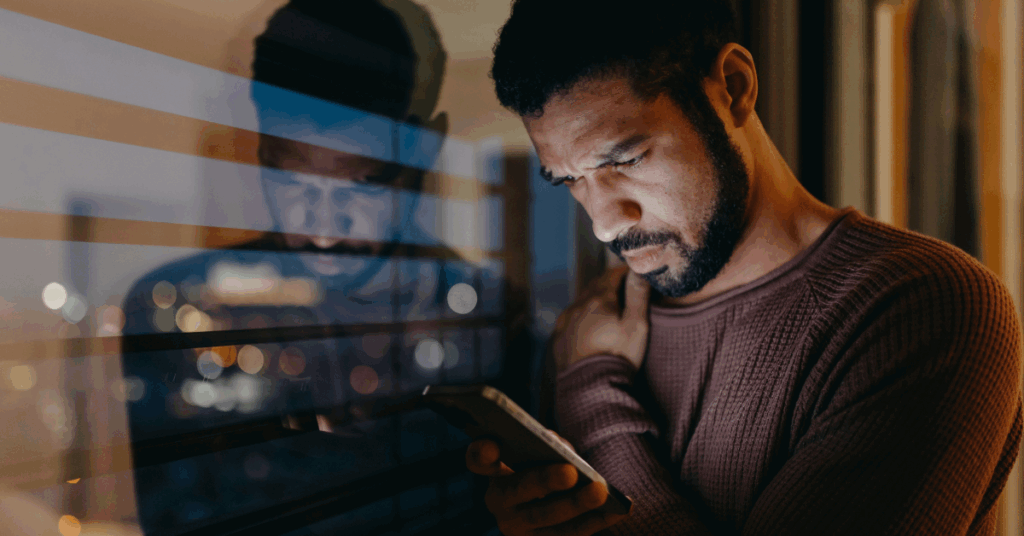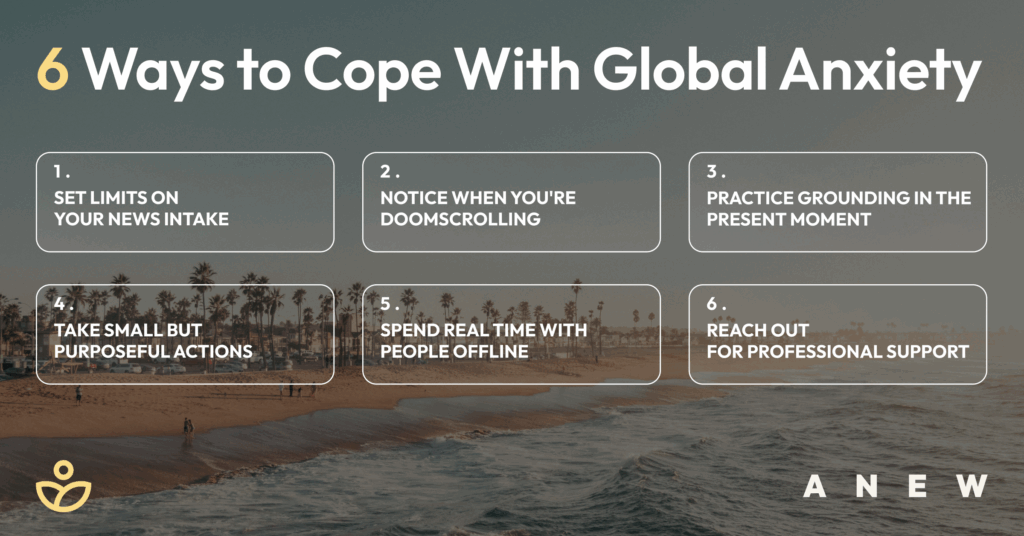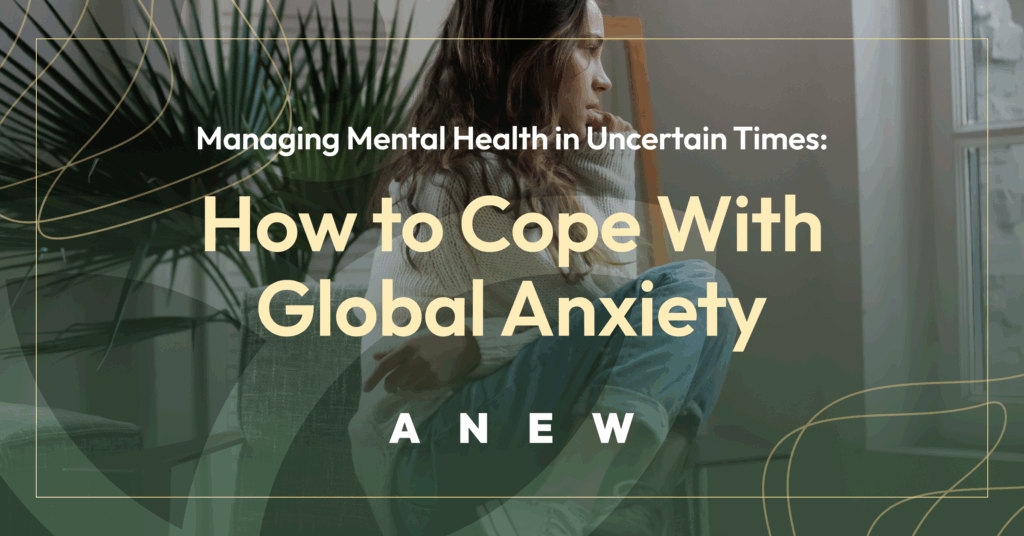If you’ve been feeling on edge lately, tense, tired, or just deeply unsettled, you’re not imagining it. The world has been heavy. Between the war in Gaza, escalating U.S. political chaos, climate disasters, economic uncertainty, and a 24/7 news cycle that seems to specialize in worst-case scenarios, it’s no wonder so many of us are struggling.
Hear from Kate Johnson, LMFT, on what gentle ways you can process and take care of yourself. https://www.instagram.com/p/DOe6EGvj2Ta/?next=%2Fanew_therapy%2F%3Fhl%3Den&hl=en
Maybe you’ve caught yourself doomscrolling late into the night, heart racing. Or maybe you wake up already feeling drained, like the weight of the world hits you before your feet even touch the floor. If that sounds familiar, you’re definitely not alone. You’re not crazy for caring, and you’re not just being sensitive. You’re reacting to a constant flood of heartbreaking, high-stakes stories that were never meant to be consumed all at once. If your nervous system feels like it’s stuck in overdrive, it’s because it probably is. That’s not a personal failing. Your system is simply overwhelmed by a pace and pressure it was never built to handle.
In this guide, we’ll break down what global anxiety is, why it’s hitting so hard right now, and how to take back control of your mental health without tuning out or shutting down.
What Is Global Anxiety?

Global anxiety isn’t a clinical diagnosis, but it’s a very real phenomenon. It’s the chronic stress, dread, or helplessness people feel in response to large-scale world events that we’re constantly exposed to but have little to no control over.
Global anxiety might look like:
- Obsessively checking the news
- Feeling panic or despair after scrolling through social media
- Difficulty concentrating due to distress about war, famine, or politics
- Feeling guilty for experiencing joy when others are suffering
- Disrupted sleep, mood swings, or hopelessness triggered by world events
Why the World Feels So Heavy Right Now
We’re more connected than ever before… and that’s not always a good thing. Smartphones and social media mean we’re constantly exposed to breaking news, raw footage of disasters, and hot takes that fuel our fears.
This constant exposure can trigger our body’s stress response over and over again, leading to anxiety, burnout, and even physical symptoms like headaches or stomach issues. Psychologists sometimes refer to this as vicarious trauma – a stress response not from experiencing something firsthand, but from witnessing or hearing about it repeatedly.
How to Cope With Anxiety Caused by World Events

1. Set News Boundaries (and Stick to Them)
You don’t need to cut off the news entirely to protect your peace. But you do need to create boundaries that let you stay informed without spiraling.
Try:
- Limiting your news intake to once or twice a day
- Choosing one or two trusted sources, rather than jumping between apps or channels
- Avoiding the news first thing in the morning or right before bed
- Unfollowing or muting accounts that constantly post distressing content
2. Recognize the Signs of Doomscrolling
“Doomscrolling” is when we compulsively scroll through bad news even though it’s making us feel worse. It can become a self-reinforcing loop: your anxiety drives you to seek more information, and that information deepens your anxiety.
To break the cycle:
- Set a time limit (10–15 minutes max)
- Use an app blocker or screen timer
- Replace the habit with a healthier one (like reading or journaling)
3. Ground Yourself in the Present
Global events feel so overwhelming because they are, by nature, out of your control. When your mind spirals into the “what ifs,” it helps to come back to what you can see, hear, and feel right now.
Simple grounding practices include:
- Box breathing (inhale for 4, hold for 4, exhale for 4, hold for 4)
- Naming five things you can see, four you can touch, three you can hear, two you can smell, and one you can taste
- Spending time outdoors or touching something natural (grass, leaves, water)
4. Take Purposeful Action
Helplessness is at the root of a lot of global anxiety. One of the best antidotes? Doing something, no matter how small, to take action on causes that matter to you.
That might mean:
- Donating to causes you care about
- Attending a peaceful protest or community meeting
- Volunteering your time
- Educating others or having thoughtful conversations
You may not be able to stop a war or reverse climate change overnight, but small, meaningful actions can shift you from despair to empowerment.
5. Connect With Others (Offline)
Online spaces can amplify anxiety, especially when every conversation feels like an argument. Try to spend time with people in real life who make you feel grounded, safe, or hopeful.
- Schedule a coffee with a friend
- Join a local support group
- Call a loved one just to chat (not to debate the news)
Social connection is one of the most protective factors against anxiety and depression.
6. Get Professional Support
If global anxiety is impacting your sleep, appetite, relationships, or ability to function, it may be time to talk to a mental health professional. Therapists can help you build coping tools, challenge catastrophic thinking, and develop a plan to protect your peace without ignoring what’s going on in the world.
Innovative treatments like ketamine therapy, Spravato, and TMS (Transcranial Magnetic Stimulation) are also making headlines for their rapid effectiveness in reducing treatment-resistant anxiety and depression. These are especially worth exploring if traditional therapy or medication hasn’t worked for you.
You Can Care Without Collapsing
If you’ve been feeling like everything’s just a little too much lately, you’re not alone. Truly. A lot of people are holding it together on the outside while quietly unraveling inside. That doesn’t mean you’re too sensitive. It means your compassion is intact, and that matters more than ever.
You don’t have to tune out to survive. And you don’t have to carry the weight of the world on your shoulders just to prove you care. There’s a way to stay present, to stay compassionate, and still protect your peace.
Our job at Anew Therapy is to help you stay human in a world that asks too much – and remind you that you don’t have to do it alone.
Whether you’re feeling anxious all the time, stuck in a cycle of doomscrolling, or just exhausted from the noise of it all, we’re here to help you find steady ground again. Our team offers therapy that’s down-to-earth and practical, as well as innovative mental health treatments such as TMS, ketamine, and Spravato.
You don’t have to ignore what’s going on in the world to feel okay. You just need the right tools, some support, and a little space to breathe.Let’s figure it out together. Reach out when you’re ready. We’re here.


